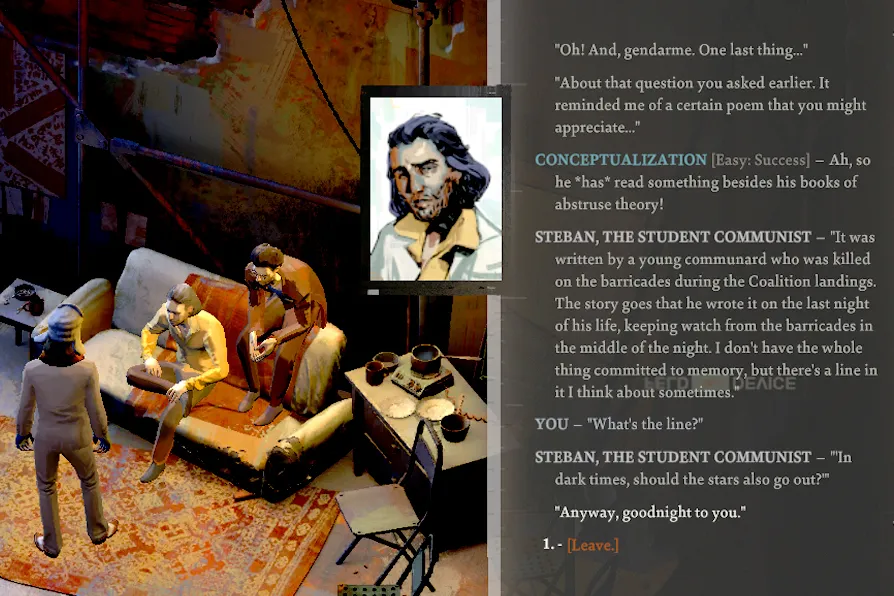Releases from Rahsaan Roland Kirk, Maggie Nicols/Robert Mitchell/Alya Al Sultani, and Gordon Beck Trio and Quintet
SCOTT ALSWORTH celebrates that, for the first time, a British videogame workers’ union has received formal recognition from their employer

 POLITICALLY CHARGED LEGACY: A still from Disco Elysium featuring the character Steban, the student Communist [Pic: Courtesy of ZA/UM]
POLITICALLY CHARGED LEGACY: A still from Disco Elysium featuring the character Steban, the student Communist [Pic: Courtesy of ZA/UM]
MOST of us missed it — a little hope amid our daily doomscrolling.
Caught between the onslaught of continued videogame industry layoffs, with Just Cause developer, Avalanche, recently announcing redundancies and their intention to close their Liverpool studio, and the grotesque unveiling of Tilly Norwood, the world’s first AI-generated actor, something positive made the news.
In fact, it made history. For the first time, a British videogame workers’ union received formal recognition from their employer.
Such a landmark achievement could only have sprung from the politically charged legacy of Disco Elysium, that 2019 breakout hit which struck a decisive blow, not only for Marxism, cultural democracy and counter-hegemony, but for videogames as art.
Similarly, it seems fitting that this latest initiative has been realised by dozens of workers at the game’s publisher and developer, ZA/UM; a company shadowed by controversy following the ousting of its openly communist creatives and an allegedly fraudulent takeover, staged by a cabal of wealthy stakeholders. Since then, several projects have been cancelled, approximately one quarter of the studio’s staff have been fired, and fans have pledged to boycott the team’s follow-up title, Zero Parades: For Dead Spies, a story-rich RPG (role-playing game) that clearly seeks to break from Disco Elysium’s IP while remaining its spiritual successor.
Given these events, so easily mapped to class conflict, a climate of cynicism can only be expected. The voluntary decision to formally acknowledge workers, now organised in-house as the ZA/UM Workers’ Alliance and represented by the larger Game Workers branch of the IWGB, has led to further criticism, with the optics on maligned investors suggesting either a pre-emptive strategy to avoid negative press from statutory recognition, or a high-stakes PR ploy, aimed at co-opting Disco Elysium’s left-leaning playerbase with a show of labour solidarity, softening resistance ahead of the studio’s next big release.
The high-level reasons, however, are neither here nor there. A win for game workers at ZA/UM is a win for game workers everywhere — and when Zero Parades: For Dead Spies rolls out, it ought to be reviewed on its own merits and revolutionary potential.
But that’s to get ahead of ourselves and perhaps lose sight of the industrial milestone the sector’s reached. As far as victories go, it’s fair to say this one’s twofold. On the one hand, and in a very immediate sense, a committee of developers has just secured unprecedented collective bargaining power after six months of negotiations; on the other, they have shown anything’s possible when we join a union and fight together.
That latter point is particularly important. Earlier this year, I was lucky enough to speak with students and young game workers while manning the IWGB Game Workers’ booth at Brighton’s Develop conference. Many were unfamiliar with the concept of a trade union, or felt they were a thing of the past — which isn’t really surprising. Fifty years of union-busting under successive Tory and Labour governments will do that.
Nevertheless, I was heartened by a burning desire for change and a keen understanding of the problems blighting our industry. After explaining what we did and what we stood for, I found I was speaking not so much to a generation that needed convincing but one that needed to see, as the late Mark Fisher so deftly put it: “A hole in the grey curtain of reaction which has marked the horizons of possibility under capitalist realism.”
Suffice to say, in addition to being a historic moment in the struggle for workers’ rights, staff at ZA/UM have shown there’s still power in a union. Whatever the rationale of the company’s shareholders, and regardless of whether Zero Parades: For Dead Spies meets expectations, or fires a materialist broadside just as Disco Elysium did, this is an exciting development. And indeed, a hopeful one — for while this agreement may be the first, it certainly won’t be the last.










